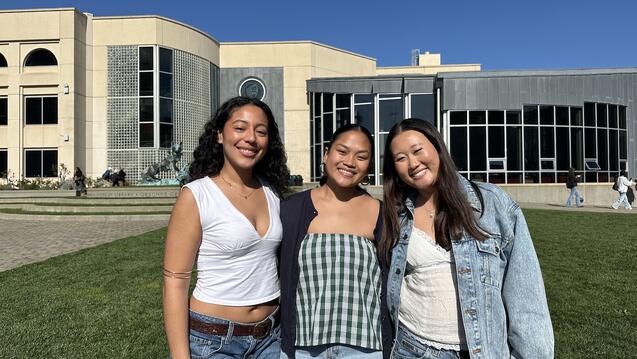Oakland Teacher Strike: USF School of Education Statement of Support
At the University of San Francisco School of Education, we are committed to a Jesuit-inspired social justice mission. We consider that our responsibility is to support teachers across the country who are standing up on behalf of a decent education for the children and families and in defense of public education. For this reason, we support the Oakland Education Association’s decision to call a teacher strike. Our university educates teachers, counselors, and school leaders for city schools; therapists and practitioners who are focused on equity and providing excellent opportunities for children. Our faculty and staff have witnessed, first hand, how well-prepared educators struggle to do their best for students despite poor conditions for teaching and learning connected to a larger lack of investment in schools. Many of our alumni have been challenged by the impossibility of building a decent quality of life in one of the most expensive regions of the country. And Oakland teachers are the lowest paid in Alameda county. We are proud that many of our alumni are taking leading roles in teacher and community organizing.
The past year has seen an unprecedented proliferation of teacher strikes, as educators have been pushed to desperation by the legislatures that have been cutting taxes for the rich and paring down public services to a bare minimum. As in West Virginia and Los Angeles, as in Chicago and Denver, Oakland teachers are struggling in solidarity with children and families in defense of a precious but fragile ideal: education is a fundamental human right and every child, not just the children of the wealthy, deserves a school that is geared to their full development – and that means smaller classes, a full arts program, nurses, counselors, and good facilities.
Starting in poverty-wage non-union or “right to work” state-wide strikes in West Virginia, Oklahoma, and Arizona, the teacher actions have moved to richer cities, most recently Los Angeles, Denver, and now Oakland. These cities, with some of the greatest wealth in the country, with houses selling for over a million dollars on average, still treat public school teachers as second-class laborers.
As in most districts, the schools continue to reproduce outrageous inequities – with students of color and poor students being taught in the poorest facilities, contributing to high teacher turnover. A combination of inequitable quality distributed within the districts along with a patchwork of private schools and an explosion of private charter schools, has kept the racial and class hierarchies of opportunity and success intact.
Following the lead of the Chicago Teachers Union, which carried out a successful strike under the leadership of Karen Lewis in 2012, rank and file teachers union activists have taken charge of unions and focused their demands on quality education for children. This is the approach that has galvanized teacher activism in the years since.
While a living wage is a key demand of educators, working conditions that lead to student success are of equal import. OEA is calling for a reduction in class size so students, particularly in high need schools, can get more individualized attention. Another goal of the strike is to ensure that schools are staffed so that students have better access to supports from education specialists and health professionals. In some cases a specialist is not available at all, in other instances the caseload is unmanageable. The union proposes a ratio of 1 school counselor to 250 students, 1 nurse to 750 students, 1 psychologist to 700 students, 1 speech therapist to 40 students, and 1 resource specialist to 24 students. While this proposal comes with a $8.5 million cost, the suggested staffing is only what is moral, ethical and in some cases a legal obligation.
Whether it is class size, lack of resources at the school site or compensation -- OUSD is unable to retain teachers. Teachers in Oakland, and the entire Bay Area, are victims of gentrification. As high paid tech employees move in and drive housing costs up, teachers are still paid at a level more appropriate to 50 years ago. In an average year, the district will lose one out of five teachers. The percentage of new teachers leaving the district is even higher as 70% will leave within their first 5 years of teaching. In Oakland, 22% of teachers are forced to leave every year, half of the special education positions are held by first year teachers on preliminary or emergency credentials. If this kind of bleeding of professionals was occurring in any other field, say medicine or the law, it would be declared a national crisis. But our education systems continue to grind through each generation of dedicated teachers who want to commit their lives to our children. A contract that invests in fair compensation and teacher support could alleviate this widespread phenomenon.
The crisis in Oakland is exacerbated by the fact that past board leadership, while advocating charters and privatization, wasted millions of dollars on consultants and side deals that weakened Oakland’s financial standing. The direction of the current board is not that different from the past, envisioning the closing of more public schools and opening of more charters. Under the mantle of “choice,” this administration turns away from improving the schools we have in favor of a market-based model of school entrepreneurs and non-unionized teachers working on short-term contracts. It is basically the gig economy, the Uber model, applied to education. Such an approach would only intensify inequity – creating a system of winners and losers in which the poor are blamed for their inability to prevail in the competition for good schools.
Education is a public good, not a product to be bought and sold in the marketplace. No child should have to jump through hoops or win a race to get into a good school. Oakland kids deserve no less than kids in Piedmont or Hillsborough. We argue strongly for a mission of equity, the defense of public space and public services that are fair for all of our children.
There is wide support in the Oakland community for the teacher strike. Parents have been busy organizing “Solidarity Schools,” community businesses are dotted with signs announcing “We Stand with Oakland Teachers” and students at several district high schools have organized walk outs, marches, letter writing campaigns and powerful testimonials at public school board meetings. Despite the disruption that a teacher strike causes for families, many residents of the town and the wider Bay Area are standing in solidarity with Oakland teachers, hopeful that a resolution will arrive quickly but preparing to do what is necessary to stand up for public education. Educators are not simply fighting for better pay or improved working conditions, they are fighting for children and committed to bringing about more equity, excellence and opportunity for students across the district.
Teachers and families around the country have been pushed to the brink and are finally saying “enough!” Too many legislatures, investors, and foundations have been advancing a narrative of education that has been harmful to students and communities. It is a narrative that blames teachers instead of recognizing the need for more resources, that charges children and communities for disadvantages they suffer, that proposes discipline and regimentation for the poor while offering a rich and reflective curriculum to the privileged. There are very few forces that can stand up to this “reform”agenda. The main one, the most powerful one, is teachers unions. When they organize with communities and students, as is happening in Oakland, they not only win wage and condition reforms, but they have the potential to reverse the direction of school policy and return our society to the values of a public square and a public good, to the human right of every child to access a powerful and meaningful education. This is what is at stake in the Oakland teachers strike, and why the USF School of Education stands with Oakland teachers.


